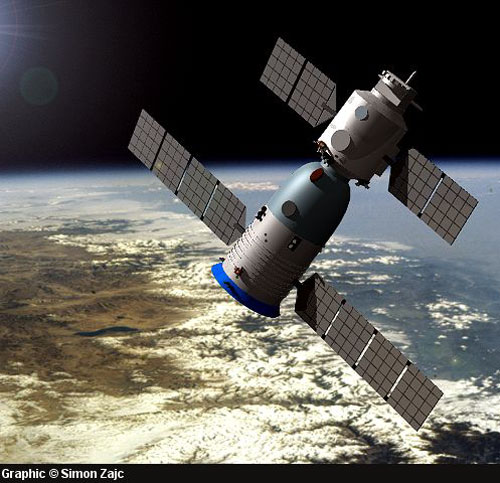This in the runup to this summers manned Shenzhou mission to dock with China's Tiangong -1 module / habitat.
Aviation Week....
China's Shenzhou spacecraft

Aviation Week....
Bolden Reins In China Partnership Ideas
As Europe and China prepare to talk potential International Space Station (ISS) cooperation in Paris this month, NASA’s top official is tempering expectations, absent approval from Congress and all five nations supporting the orbiting outpost.
“We’ve got to discuss it through the interagency process and find out, OK, what is it that they want to do, if and when they come on board,†NASA Administrator Charles Bolden says, adding that while NASA is prohibited by U.S. law from engaging in technical exchanges with Beijing, U.S.-Sino cooperation is possible if Congress sanctions it. “I’m just not ready to do that yet. We don’t have a need to do it,†Bolden says.
Last month, European Space Agency (ESA) Director General Jean-Jacques Dordain met with Wang Zhaoyao, director general of the China Manned Space Engineering Office (Cmseo), on the sidelines of Europe’s third ATV launch to the ISS (Aerospace DAILY, March 26). The two discussed the potential for China’s Shenzhou 9 spacecraft to dock with the ISS, a conversation that comes ahead of China’s first manned orbital docking operation with the spacecraft this summer.
“For the moment we cannot dock and rendezvous with the ISS,†says Wang, the former deputy director of Cmseo who took over earlier this year from the retiring Wang Wenbao. “We would like to have cooperation.â€
Dordain says there are no concrete proposals on the table and that the two sides are discussing a range of collaborative opportunities in the area of manned spaceflight, including astronaut training, life-support systems and utilization of each other’s space station facilities.
“The partnership of the ISS is very, very important, and I don’t take any actions that would be to the detriment of that partnership, but it can be successful only if we are open to other cooperation or other partners,†Dordain says. “Ignoring China and not raising the question of cooperation would be the worst option. For the time being, we are raising the question and discussing what we can do.â€
As Europe and China prepare to talk potential International Space Station (ISS) cooperation in Paris this month, NASA’s top official is tempering expectations, absent approval from Congress and all five nations supporting the orbiting outpost.
“We’ve got to discuss it through the interagency process and find out, OK, what is it that they want to do, if and when they come on board,†NASA Administrator Charles Bolden says, adding that while NASA is prohibited by U.S. law from engaging in technical exchanges with Beijing, U.S.-Sino cooperation is possible if Congress sanctions it. “I’m just not ready to do that yet. We don’t have a need to do it,†Bolden says.
Last month, European Space Agency (ESA) Director General Jean-Jacques Dordain met with Wang Zhaoyao, director general of the China Manned Space Engineering Office (Cmseo), on the sidelines of Europe’s third ATV launch to the ISS (Aerospace DAILY, March 26). The two discussed the potential for China’s Shenzhou 9 spacecraft to dock with the ISS, a conversation that comes ahead of China’s first manned orbital docking operation with the spacecraft this summer.
“For the moment we cannot dock and rendezvous with the ISS,†says Wang, the former deputy director of Cmseo who took over earlier this year from the retiring Wang Wenbao. “We would like to have cooperation.â€
Dordain says there are no concrete proposals on the table and that the two sides are discussing a range of collaborative opportunities in the area of manned spaceflight, including astronaut training, life-support systems and utilization of each other’s space station facilities.
“The partnership of the ISS is very, very important, and I don’t take any actions that would be to the detriment of that partnership, but it can be successful only if we are open to other cooperation or other partners,†Dordain says. “Ignoring China and not raising the question of cooperation would be the worst option. For the time being, we are raising the question and discussing what we can do.â€



Comment